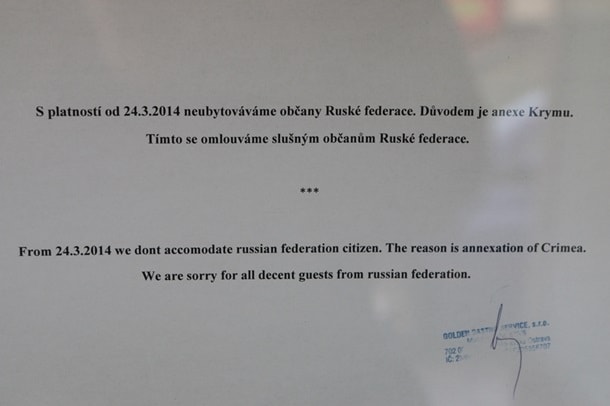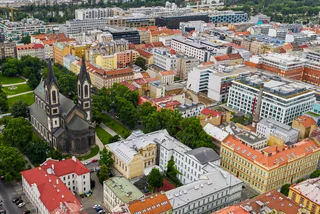Five years ago, Ostrava’s Brioni Boutique Hotel stirred controversy when it announced that it would no longer be admitting guests from Russia due to the country’s annexation of Crimea.
“From 24.3.2014 we dont accomodate russian federation citizen [sic],” read an English-language note posted at the hotel’s entrance.
PARTNER ARTICLE
“The reason is annexation of Crimea. We are sorry for all decent guests from russian federation.”
Brioni Boutique Hotel’s owner, Tomáš Krčmář, instituted the boycott of Russian guests after what he felt was a weak response from both the Czech Republic and the EU to Russian activity in Crimea.
“As long as Russia stops in Crimea, the EU is ready to sweep the whole thing under the carpet and continue in a business-as-usual manner, so as to get rid of an uncomfortable headache,” Krčmář told Radio Free Europe in 2014.
“If one’s memory is too short to learn lessons from what happened in 1939, then at least try recalling 1968 or Georgia in 2008 for that matter. As long as we are seen unable to take any pain, Russia translates it as our weakness. It is in their strongman mentality.”

Brioni Boutique Hotel was quickly hit with a fine of 50,000 crowns by the Czech Trade Inspection for violating the country’s Anti-Discrimination Act.
But Krčmář refused to pay the fine, and the case has been making its way through Czech courts for the past five years.
“I am fully conscious of the fact that my boycott of Russian tourists will hurt my pocket more than anyone else’s,” Krčmář told Radio Free Europe in 2014. He estimated that about 10% of his guests had been Russian citizens.
“I think Russia should be isolated as it has no place in Europe. Until politicians make a move, I’m doing it my way.”
Brioni Boutique Hotel soon modified the ban – accepting Russian guests who signed a letter denouncing Russia’s annexation of Crimea – and eventually removed it altogether, citing international pressure. But the fine stood – as did Krčmář’s resolve to prove his protest did not violate Czech law.
In 2016, a court cancelled the fine, ruling that the country’s Anti-Discrimination Act did not cover citizenship. That decision was then annulled by the Czech Supreme Administrative Court, who returned the case to the Regional Court in Ostrava.
In 2018, that court ruled against Krčmář and Brioni Boutique Hotel, though they lowered the original fine from 50,000 crowns to 5,000 crowns.
“While we do not question the nobility of the protest against the disruption of Ukraine’s integrity, we consider the denial of accommodation to be disproportionate,” the judge in that case declared, as reported by iDnes.cz.
Still, Krčmář was unsatisfied.
“I do not agree with the fine, even if I only have to pay one crown,” he told iDnes.cz, preparing to appeal the case in higher courts.
On Tuesday, in what may be the final word on the case, the Czech Constitutional Court cancelled the fine, ruling in favor of Brioni Boutique Hotel.
The Court found that while discrimination based on ethnicity or religion would have violated the country’s discrimination laws, nationality does not – noting that even the state itself discriminates based on nationality (for example, which nationalities can enter the country without a visa).
Additionally, the Constitutional Court went as far as to support Krčmář’s motive, citing expert opinions and even Czech State Department comments that the annexation of Crimea violates fundamental international law.












 Reading time: 3 minutes
Reading time: 3 minutes 


























